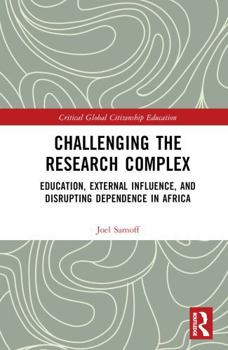Challenging the Research Complex: Education, External Influence, and Disrupting Dependence in Africa
Starting with an overview of the intersection of local and global dynamics in education in Africa, this book focuses critical attention on education research and the problematic research process.
Education held extraordinary promise at Africa's independence. Rapid expansion in access and imaginative innovations followed, but progress proved difficult to sustain. As frustration displaced optimism, recourse to foreign aid became common. Education in Africa--critical to national development-- combines high expectations and enthusiasm with distress and dependence. Local and global agendas intersect. External influence is internalized. Research is consequential, especially in reinforcing the conservative charter of most education systems in Africa, more concerned with reproducing the national political economy than changing it. Notwithstanding disciplinary border crossers, methodological orthodoxy is blinding. Social engineering remains more important than social justice. Scholarship about Africa is only rarely by Africa. Scholars study poverty and miss impoverishment. This book unpacks those relationships, exploring the narrow gaze of education research and its problematic character. Examining the research complex--interconnected institutions with distributed authority acting in concert--requires attention to how knowledge is generated, where, and to whose benefit. On this important and exciting terrain--Africa, education, research--readers will find this an accessible and stimulating analysis.Format:Hardcover
Language:English
ISBN:1032729244
ISBN13:9781032729244
Release Date:April 2025
Publisher:Routledge
Length:216 Pages
Customer Reviews
0 rating





